I have been a public speaker on genealogical and historical topics since 1992. If your society or organization needs a seasoned lecturer for an upcoming meeting, several presentations are readily available. Each of my lectures are designed to educate, entertain, engage, and challenge the audience. If your group is planning a special event and requires a customized presentation, seminar, or workshop, I would be delighted to discuss your particular needs.
Time: Length of single lectures runs about 50 minutes; brief Q & A at conclusion
Handout/Syllabus: Provided for each lecture
Fees, Terms, & Availability: Please CONTACT me for details.
TOPICS
BLOCKED-LINEAGE METHODOLOGY
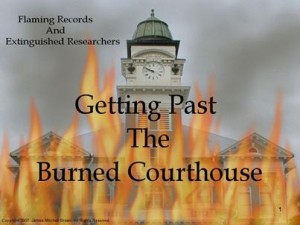 “Flaming Records and Extinguished Researchers—Getting Past the Burned Courthouse”
“Flaming Records and Extinguished Researchers—Getting Past the Burned Courthouse”
One of the most discouraging aspects of conducting genealogical research in the southern region of the United States is the loss of critical records often attributed to the phenomenon of the burned courthouse. This lecture addresses the frustrations and problems associated with record loss and offers refreshing strategies to overcome the challenge confronting family historians.
“Is There a Doctor in the House?—Remedial Remedies for the Research Maladies of the Family Historian.”
Misdirected methodology or the failure to conduct thorough research often leads to “self-imposed” research barriers which can impede or block progress in research. This program addresses the causes of genealogical brick-walls, how they can stagnate research, and offers innovative solutions to overcome such barriers.
LAND RECORDS
“Federal Land Patent Records—A Primer to Their Use and Value in Genealogical Problem-solving”
Federal land patent records are valuable resources to those who know how to access and use them. This presentation covers the basic facets of the patent process and provides case studies on how such government records can provide critical evidence to enhance one’s genealogical research.
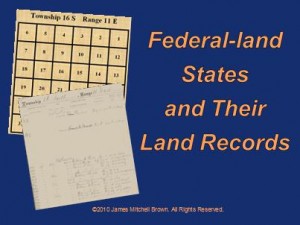 “Federal-Land States and Their Land Records”
“Federal-Land States and Their Land Records”
Throughout most of our nation’s history, federal lands in the public domain have provided the foundation by which many of our ancestors were able to acquire land. The unique records generated during the process by which the government transferred the land to the patentee often contain critical evidence that can be used in serious genealogical investigation. This presentation provides an overview of the federal-land state system of distribution, with major emphasis on the various types of records generated from the principle Government Land Office in Washington, D.C., as well as from various local land offices established throughout the twenty-one federal-land states.*
*This subject as described above is available as a stand-alone, overview presentation. For those who desire an in-depth program which carries the subject into much greater detail, a three or four lecture seminar is also available.
“The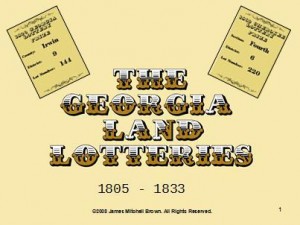 Georgia Land Lotteries”
Georgia Land Lotteries”
Georgia was the only state to utilize a lottery system for land distribution. This lecture provides an overview of Georgia’s eight authorized land lotteries conducted from 1805 to 1833, the laws and records respective to each lottery, and the use of such unique records in genealogical problem-solving.*
*This subject as described above is available as a stand-alone, overview presentation. For those who desire an in-depth program which carries the subject into much greater detail, a three or four lecture seminar is also available.
TAX
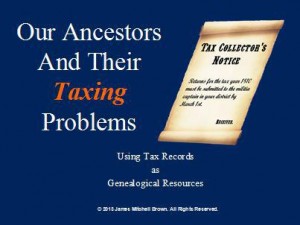 “Our Ancestors and Their Taxing Problems—Using Tax Records as Genealogical Resources”
“Our Ancestors and Their Taxing Problems—Using Tax Records as Genealogical Resources”
Tax records represent one of the most valuable types of resources for genealogical study. Yet too often they are underused, or their meaning is not easily discerned. This presentation introduces the audience to this important source of evidence and through case studies accentuates how their uniqueness can often provide strategic clues to help resolve complex genealogical problems.
PROBATE
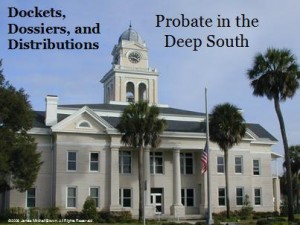 “Dockets, Dossiers, and Distributions—Probate in the Deep South”
“Dockets, Dossiers, and Distributions—Probate in the Deep South”
This lecture introduces the audience to the process of probate. The discussion primarily dissects the probate process through a visual sampling of the various records one might expect to encounter when researching estates in the south. Legal terminology, the value of inventories, the process of contestation, and the application of the varying laws of consanguinity (rules of descendancy) are among several sub-topics covered.
CENSUS
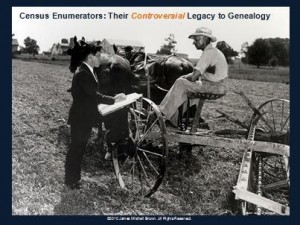 “Census Enumerators—Their Controversial Legacy to Genealogy”
“Census Enumerators—Their Controversial Legacy to Genealogy”
Despite the criticism they have often received, for over two hundred years federal census enumerators have provided unique decennial snapshots about people in the United States and have given the modern genealogist a unique foundation upon which to conduct ancestor study. Using a wide variety of entertaining examples, this lecture debunks some of the myths regarding the census taker and presents a humorous yet realistic perspective to the research value of their efforts.